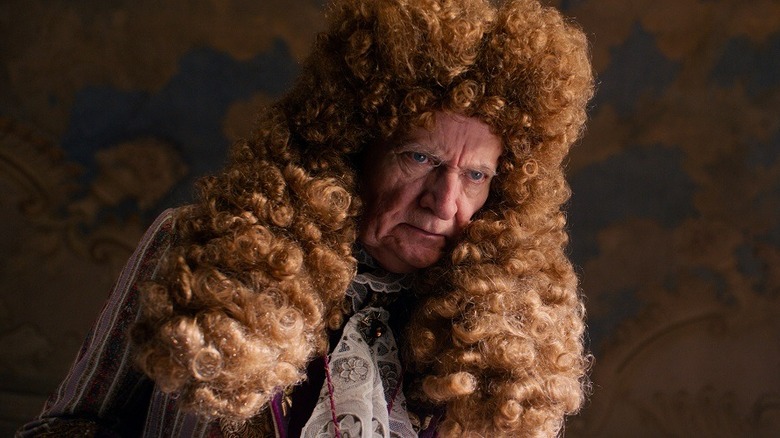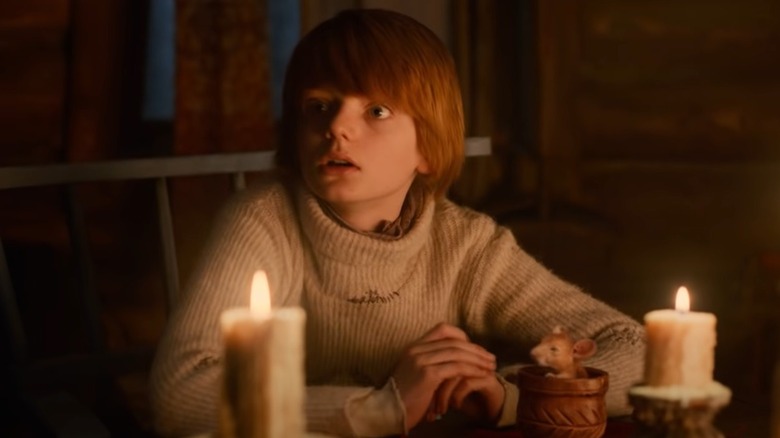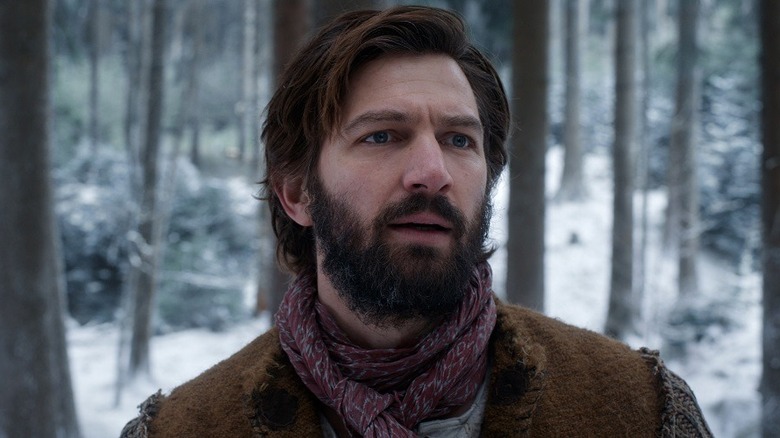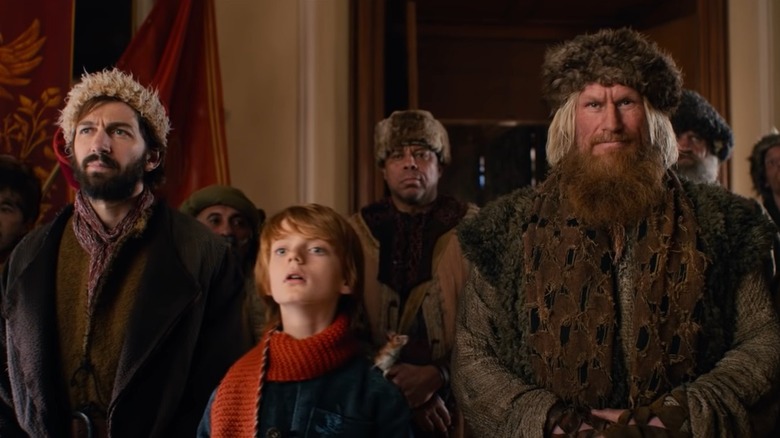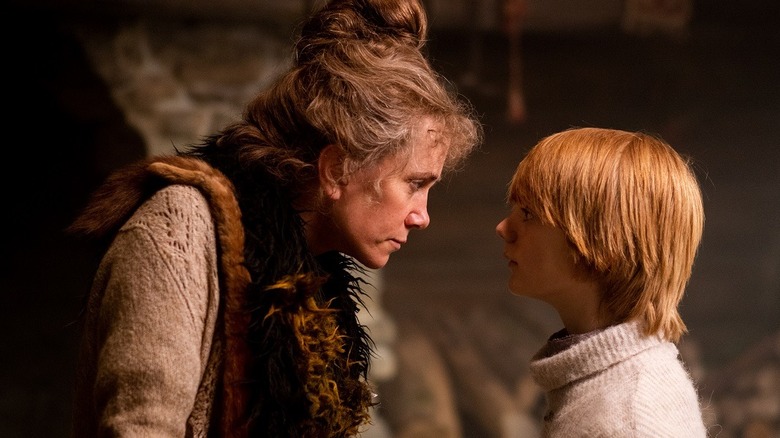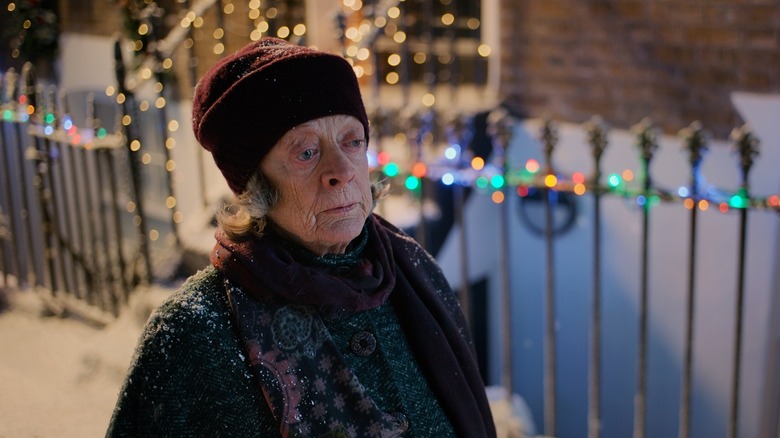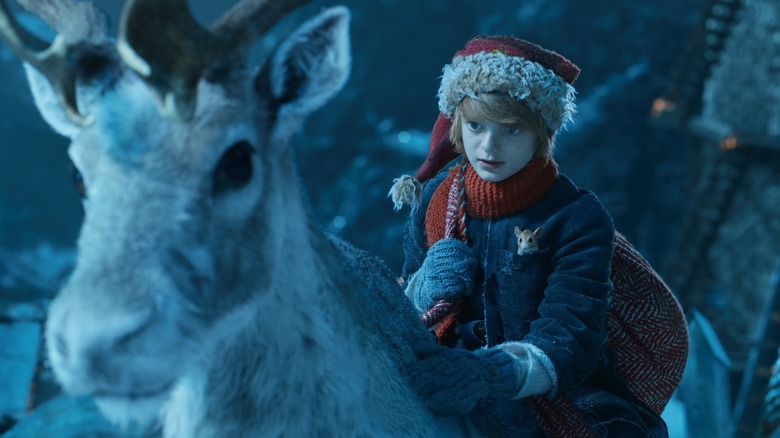Things Only Adults Notice In A Boy Called Christmas
This content was paid for by Netflix and created by Looper.
Kris Kringle gets a heartwarming origin story in "A Boy Called Christmas." In the film, we meet a no-nonsense woman named Aunt Ruth (Maggie Smith), who pays a visit to a trio of children who've suffered a tremendous loss and manages to get them back into the spirit of the season with a simple tale of hope.
On Christmas Eve, while she babysits the kids for their beleaguered father, Ruth regales them with the ancient story of Nikolas (Henry Lawfull), a boy who channels his own pain into a sense of purpose as he sets out to find the fabled town of Elfhelm against all odds. With just his pet mouse and a friendly reindeer at his side, little Nikolas braves the wintry abyss to find the place that once brought his mother so much joy, all in hopes of saving his father and his ailing kingdom. But even Elfhelm is suffering, and it's up to Nikolas to rekindle joy in all of the land, even as he grapples with his own grief.
"A Boy Called Christmas" is good holiday fun for kids and adults alike, but there are some aspects of the film that are likely to land with more mature audiences. Here's a look at some of the things only adults might notice in this holiday tale.
The king is a monster
For starters, the whole reason the kingdom needs some Christmas magic in the first place is because the king (Jim Broadbent) has been depriving everyone in town, keeping all comfort and sustenance for himself.
Need proof? Look no further than the beginning of the story, when the impoverished villagers — including Nikolas' dad, Joel (Michiel Huisman) — are summoned to the castle and receive orders to scour the woods for something that can bring the townsfolk hope. When other, wiser suggestions come rolling in — food, healthcare, living wages, and fair government among them — the king quickly sidesteps those comments and suggests everyone go on a dangerous mission to find another way.
Clearly, the people are wise to the king's neglect. As Joel notes in a quiet aside to his son, the king may be a "great man," but he's not the only one who deserves to have a good life. Still, they do go out and risk grave peril to fulfill his wishes, with a vague reward at stake. And in the end, the king essentially gets away with not having to actually govern and guide his people. It's Nikolas who returns with a new source of joy in his bag full of toys, and as thanks, the king even insists that Nikolas spearhead the Christmas effort every year from now on because he doesn't want to do it himself.
That's some turnip doll
Aunt Ruth doesn't divulge too many details about what happened to Nikolas' poor mother, except to suggest that the bear Nikolas and his dad face at the start of the story had something to do with it. As one modern child glibly notes of this missing piece of the tale, "Bear ate his mom. Got it."
One thing we do know about his mom is that sometime before she died, she crafted Nikolas' favorite (and, frankly, only) toy — a ragdoll made from a turnip. We're also told that it's been a full two years since she passed, and for most vegetables, that'd be more than enough time for such a thing to completely mold, rot, and maybe even disintegrate. However, Nikolas' ragdoll is still going pretty strong at the start of this story, and even when Aunt Carlotta (Kristen Wiig) cruelly cooks it into Nikolas' soup, it's still green and clearly tasty enough to eat.
Considering how absolutely inedible any other years-old vegetable would be, it's clear Nikolas' mom must've either gotten this goodie from Elfhelm or put a little of her own magic into the mix when she made the doll.
Nikolas' dad never actually breaks bad
As if losing his mother wasn't tragedy enough for one kid, Nikolas also has to endure the loss of his father, who cuts the tether to his own rescue sled when he realizes that it's preventing Nikolas' reindeer, Blitzen, from flying the boy away from danger. Perhaps it's no surprise that Joel is so willing to sacrifice himself for his child. Right at the start of the story, we see that he's willing to tussle with a giant bear to give his boy a chance to run away before Anders (Rune Temte) shows up with his trusty arrows and saves them both.
There is a moment in the movie, though, when it seems as though Joel may have given into the darkness, as he tells Anders and the other hunters to tie up Nikolas right alongside the boy elf Little Kipp, who they've all kidnapped. However, if you listen closely to what the hunters are saying as Nikolas arrives at their campsite, it seems that Joel has always been on the right side of the matter and was feigning allegiance to this group. One of the hunters briefly says to the other, "Depends on what promise you want to keep, the one to your king or the one to your son." It sure sounds like they're speaking about Joel, who's not sitting with them at the time and may be conflicted about what they are up to.
Anders is a nod to a father of fairy tales
Perhaps it's no coincidence that the bow-wielding buddy of Nikolas' dad is named Anders. That moniker might just be a bit of a tribute to Danish author Hans Christian Anderson, who created many of the most famous and lasting fairy tales of all time, including "The Princess and the Pea," "The Ugly Duckling," "The Emperor's New Clothes," and "The Little Mermaid," just to name a few.
One of Anderson's most celebrated and oft-adapted stories is "The Snow Queen," which seems to have inspired at least a few elements of "A Boy Called Christmas." In addition to the wintry landscape, the involvement of reindeer, and the existence of trolls, the tale also features a bit of storytime from a grandmother, which inspires the children to persevere in a critical moment of crisis. Of course, Anderson's stories are known to have some dark and twisted elements as well, so the fact that Anders can be a bit ruthless in this film is likely no accident.
Aunt Carlotta is just there to steal that house
Upon arrival at Joel's house, Aunt Carlotta puts on a good enough face in front of her brother, but after he's gone, she shows that it's not just her teeth that are rotten to the core. She's actually a loathsome lady who, at best, is trying to break little Nikolas' spirits just for kicks and, at worst, is trying to literally kill him by leaving him out in the cold. In either case, she does all manner of hideous things to Nikolas, from throwing his pet mouse, Mika, across the lawn to destroying his father's hat and his beloved toy from his mother.
It's hard to know why a woman like this would even bother to show up to watch over Nikolas in the first place — unless she already knows Joel's mission is too dangerous to return from, and she's just there to collect his little cottage for herself. After all, she doesn't exactly vacate the place once Nikolas leaves, does she? If that's the case, just like the king, she absolutely gets her way in the end — plus some goodbye chocolates hand-delivered by Nikolas to boot!
You can't spell 'truth' without Ruth
Speaking of misunderstood aunts in "A Boy Called Christmas," the present-day kiddos sure do get it wrong when it comes to their Aunt Ruth. At first, they're very disappointed to have to spend the evening in her care while their father goes out, complaining that she's rude. By the end of the film, though, they're absolutely riveted by her story session — and they seem to be warming up to her dry wit too.
In Ruth's tale about Nikolas' past, we get to meet a character in Elfhelm called the Truth Pixie, a magical flying girl who's locked up in prison when Nikolas is captured by the guards working for the town's new human-hating leader, "Mother" (Sally Hawkins). The Truth Pixie helps Nikolas escape the prison and, eventually, the village as well, but her inability to lie causes a couple of hiccups along the way, including her telling the guards where they are because, well, she can't lie, and she can't not say something either.
At first, the kids might be inclined to compare Aunt Ruth with Aunt Carlotta, but more than once, she drops some hints that she's more closely aligned with another character. Several times, she tells the children that she does not lie, and when she says her Christmas story is not fictional, it becomes clear that she is the Truth Pixie in the story. How else could their entire living room be transformed into a winter wonderland just as the kids are starting to get back into the spirit of the season? Ruth, a name which not coincidentally makes up 80% of the word "truth," eventually tosses up some fireworks — the Truth Pixie's signature piece of magic — for added effect.
The whole tale is meant to help the kids cope
Perhaps the biggest thing adults are bound to notice in "A Boy Called Christmas" is how Nikolas' story is actually a very thoughtful allegory — one that's perfect for the troubled kids listening to the tale.
We don't get to know much about how these three children have lost their mother, but it's clear that they've been overcome with grief and also have a bit of separation anxiety from their father as a result of their loss. (Consider the scene when they desperately make sure that Nikolas will reunite with his own dad in the Christmas tale before Aunt Ruth goes any further. Gulp!) Wisely, Ruth's story doesn't dwell too much on the details of Nikolas' mother's demise, but instead, it includes a lot of details about how much everyone loves and misses her. Her impact on Elfhelm is immense, and she even makes the meanie "Mother" elf happy and sappy.
Ruth doesn't shy away from tragedy in her tale, of course, but she also carefully supplements her story with words of empathy and resilience chosen specifically for these children, like, "You can handle anything because you have handled everything," and, "Grief is the price we pay for love, and it's worth it a million times over." The phrase that really sends it all home is when she answers the littlest child's question of whether their mommy is ever coming back and says, "No, but you are the best memory of her now." Ruth's entire story is clearly designed to help the children recover their own joy just in time for Christmas, and in the end, her unique bit of magic here seems to work for them.
